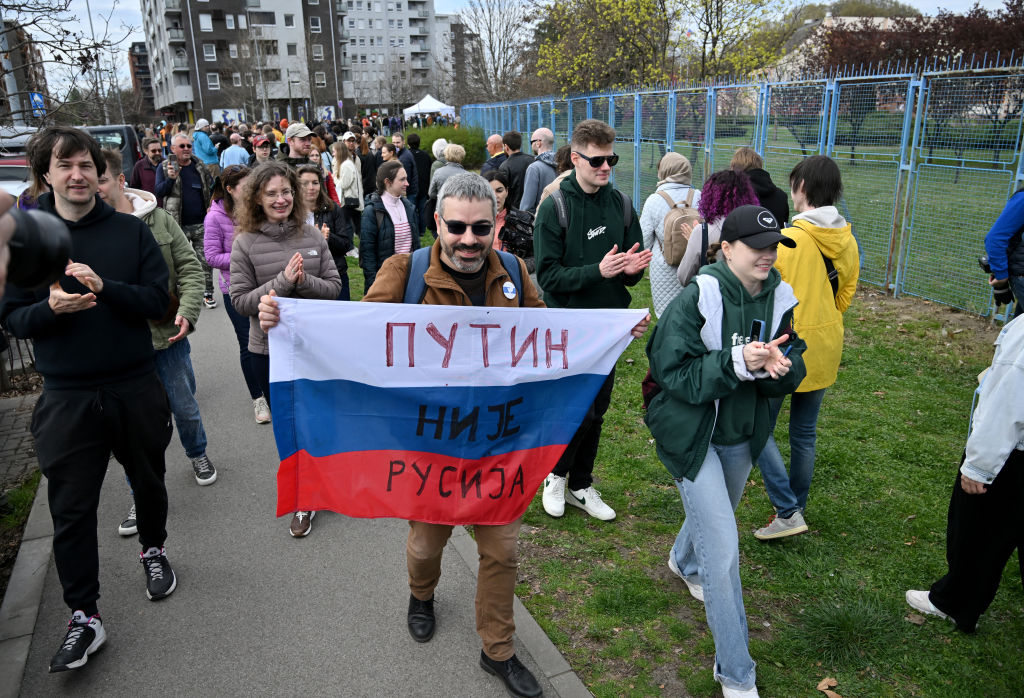Today, Russians in Serbia are heading to the polls to cast their vote and protest against what many see as a sham presidential election. A polling station in the capital Belgrade opened this morning at 8am, but many decided to turn up at ‘Noon against Putin’, a protest called by the late Russian opposition politician Alexey Navalny.
Tens of thousands of Russians have settled in Serbia since the start of the war in Ukraine. Like millions of other Russian exiles around the world, they are eligible to vote in this weekend’s polls—which are almost certain to hand Vladimir Putin another six years in power. With no credible opponent and only one possible result, I asked Russians why they are bothering to show up at the polls.
Most young, opposition-minded Russians who turned up today know that the result of this election is a foregone conclusion. Putin is set to enter his fifth six-year term, keeping him in power to at least 2030. Russians here are resigned to the idea of Putin’s lifelong rule. Indeed, anyone born in this century has only ever known one president.
A 26-year-old project manager from Moscow tells me that ‘everyone understands that this is not an election, but rather an “electoral event”’. The absence of independent media, intimidation of opposition, voting in the occupied territories, and lack of genuine opposition candidates on the ballot, mean that the result of this election is pre-ordained.
A 35-year-old software developer from Moscow acknowledges that ‘we are playing a game without a chance to win’. The only reason to vote or ruin your ballot is to ‘add some work to the election commission and maybe ruin their mood.’ This alone, he jokes, is a good enough reason to participate.
But while ‘voting won’t change anything’, many insist that participation is not futile. Russians who have turned up today to protest don’t believe their vote will necessarily change politics in Russia, but they believe it ‘is a way to show a picture that there are people against Putin’.
By voting for one of the so-called opposition candidates, or spoiling their ballot, some believe that they are sending a signal to the world that not all Russians support Putin and his war in Ukraine. As another voter says, ‘voting will not affect the result, but it will be able to demonstrate to people the unity around hatred of the government, around the desire of society for democracy’.
Peter Nikitin, who founded the Russian Democratic Society (RDO) in Serbia, worries that ‘a lot of people in the West are convinced that Putin represents the Russian people.’ The point of showing up today, he tells me, ‘is to show the world that there are people who oppose the war and the dictatorship’.
Others fear that voting risks playing into Putin’s election charade. Indeed, some who have come to the polling station today don’t intend to vote. A lawyer from Moscow, who moved to Belgrade with her young family at the start of the war, tells me why she won’t be voting. ‘I don’t want to take part in this game’, she says. ‘I do not want to create the appearance of their legitimacy.’
But for most people here, voting is one of the few ways left to have their say and express opposition to their government. A 27-year old business analyst from the south of Russia says that, while she is ‘100 per cent sure that these elections are going to be fabricated… I want to vote and be around people who think likewise… It’s the only way for me to show that I’m against what’s happening in Russia… I think I do it for myself mostly.’
At some distance from the Kremlin, Russians here feel freer to express discontent. Along with the thousands of Russians who have come to Serbia to open businesses or escape the draft, there are also several prominent opposition figures who have been organising protests in support of Ukraine, and petitioning for the candidacy of anti-war figures such as Boris Nadezhdin.
Anti-war activists in Serbia face some pressure from the local authorities to limit their dissent. Russian dissidents have even been denied entry into Serbia or had their visa requests denied. Most recently, 54-year old Elena Koposova, who has lived in Serbia with her family since 2019, was given an expulsion order for signing an open letter against the war. This order has since been overturned following a public outcry.
I asked Russians here if they feel pressure to vote a certain way. In the notice posted on the Russian embassy website, inviting Russians in Serbia to vote in the elections, voters were duly warned that there would be ‘video surveillance at the polling station’. But most people I spoke to feel free to express their discontent here. As one young Russian said, ‘we are not breaking any rules.’
Unlike in Russia, where the pressure to conform is great, and where a large majority is set to cast their ballot in support of Putin, in Serbia the vast majority of those heading to the polls are doing so in opposition to their president. Here in Belgrade, they feel able to express their disapproval for what they see as illegitimate elections and show solidarity with Russians back home who oppose Putin and his war in Ukraine.






Comments